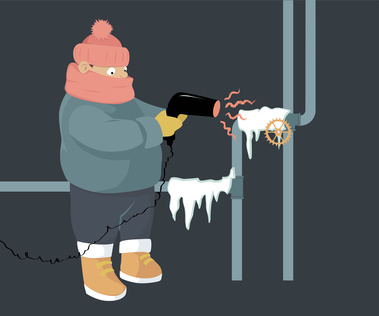
Did you know that when water freezes it expands and can cause damage to your home? Here are some practical tips and advice that could help prevent damage to your home from frozen and burst pipes.
In cold periods, ensure the central heating system remains at a constant temperature at a level above which freezing would not normally occur.
Know where the water shut-off valve (stopcock) is to isolate the supply in an emergency. Test it to make sure it can be turned off easily in an emergency.
Make sure your pipes are lagged and your tank is insulated.
If you have any dripping taps replace the washers. If dripping taps freeze they'll block your pipe and cause damage.
Check plumbing joints and pipes for any signs of freezing. If you spot any damage call a plumber.
If you are going to be away for an extended period consider draining down your plumbing and heating system, but please do so with professional advice.
Ask a friend, relative or neighbour to visit whilst you are away. If you do have a burst pipe this will minimise the damage.
What you should do if a water pipe freezes...
A frozen pipe emergency should be dealt with promptly by turning off the water supply and turning off the stopcock in the cold water tank. To avoid further damage make sure that anything that has frozen around the pipe is protected.
Open the tap that is closest to the frozen part of the pipe and thaw it out using a gentle heat source, such as a hot water bottle or hair dryer, and work back to the hot water tank. Do not use an open flame or boiling water to thaw them out.
What to do if you do have a burst pipe
Should the pipe burst, it can cause major damage to your home and contents. Ageas can help in the event of any damage, but there are also some preventative measures that you can take:
Act immediately. The sooner you can stop the water escaping, the more you reduce the risk of further damage.
Turn off the water supply at the main stopcock.
Turn off the stopcock in your cold water tank (usually found in the loft).
Switch off the central heating system and any other water heating installations to avoid further damage.
If the ceiling is bulging, create a hole and place a bucket underneath.
If you can, find the source of the burst.
If it is the cold water tank, empty it by running all the cold taps and flushing all toilets a number of times.
You should also drain the hot water system. First turn off the boiler and immersion heater if you have one then turn off the cold feed pipe to the cylinder and run all the hot water taps to empty the pipes of water.
Call a plumber and an electrician.
Take a photograph of all damaged items and make a list.
DO NOT TOUCH ANYTHING ELECTRICAL - call an electrician
What to expect when you make a claim
We will give you advice on how to proceed. If the damage is substantial we will instruct one of our Loss Adjusters to manage your claim and advise you on the best course of action.
How will I know when my property is dry?
The loss adjuster will instruct a professional restoration company. Once your house is dry a Certificate of Dryness is usually issued. Personal items may either be replaced or restored depending on the level of damage and subject to the terms and conditions of your policy.
* These measures will not guarantee that you do not suffer a burst pipe but may reduce the likelihood of it happening.